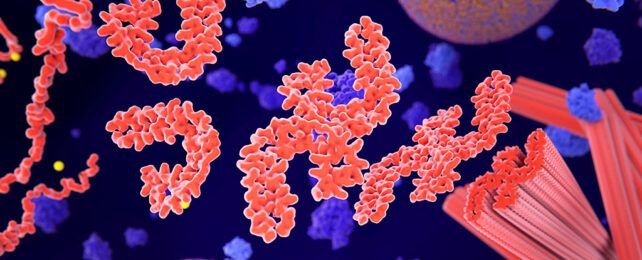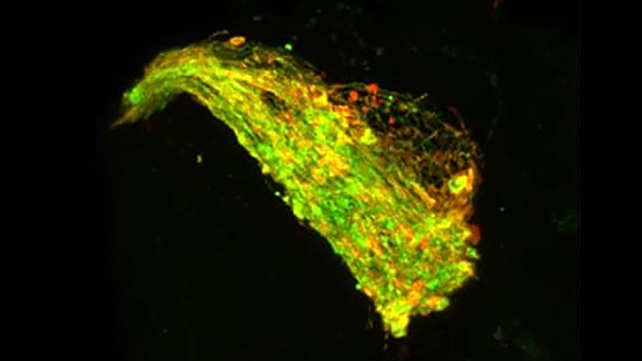ARTICLE AD
 Tau proteins (red-orange) interrupt normal neuron operation. (Selvanegra/iStock/Getty Images Plus)
Tau proteins (red-orange) interrupt normal neuron operation. (Selvanegra/iStock/Getty Images Plus)
Brains affected by Alzheimer's disease are characterized by damaging clumps and tangles that interfere with neurons – but a new study describes a drug that could potentially suppress half the problem.
The drug is RI-AG03, and it's a peptide inhibitor (a blocker of proteins). In tests on fruit flies and human cells, it has shown a positive effect in reducing neuron degeneration and the tangling of tau proteins. In the case of the fruit flies, the lifespan of the insects was extended by as much as 35 percent.
What makes RI-AG03 special, according to the international team of researchers behind the study, is the way it targets two specific 'hotspots' on tau proteins where clumping tends to happen, producing long and twisting threads called fibrils.
"There are two regions of the tau protein that act like a zipper to enable it to aggregate," says neuroscientist Amritpal Mudher, from the University of Southampton in the UK. "For the first time, we have a drug which is effective in inhibiting both these regions."
"This dual-targeting mechanism is significant because it addresses both domains that stimulate tau aggregation, potentially paving the way for more effective treatments for neurodegenerative diseases like Alzheimer's."
 Tau proteins (in red) building up in the neuronal circuits of a fruit fly. (University of Southampton)
Tau proteins (in red) building up in the neuronal circuits of a fruit fly. (University of Southampton)Tau proteins in the brain aren't all bad. When healthy, they help maintain the stability of a neuron's various branches. But in some Alzheimer's brains – whether as a cause or a consequence of the disease – their fibrils go into overdrive.
The RI-AG03 drug was produced using computational biology techniques to specifically target both fibril zones on the tau protein. The effectiveness it has shown in these experiments are evidence of a successful drug design – even if there's a lot of work still to do before it can be used in humans.
And because of the specific way RI-AG03 was designed, it's precisely targeted. When it comes to trying to make drug-induced changes in the brain, it's vital that there's no collateral damage in this most delicate of systems.
"Current aggregation inhibitors have had many side effects because they can interfere with the functions of many other proteins," says neuroscientist Anthony Aggidis, from the University of Southampton.
"RI-AG03 is specifically designed against the tau protein, meaning it's less likely to undesirably interact with other proteins."
The next stage for this particular drug will be tests on mice, and after that clinical trials can begin. But while many tau-based therapies have shown success in animal models, many have failed to provide clinical benefits in humans thus far.
"Our research represents an important step toward creating treatments that can prevent the progression of diseases like Alzheimer's disease," says Aggidis.
"By targeting both of the key areas on the tau protein, this unique approach could help address the growing impact of dementia on society, providing a much-needed new option for treating these devastating diseases."
The research has been published in Alzheimer's & Dementia.

 1 month ago
18
1 month ago
18 

